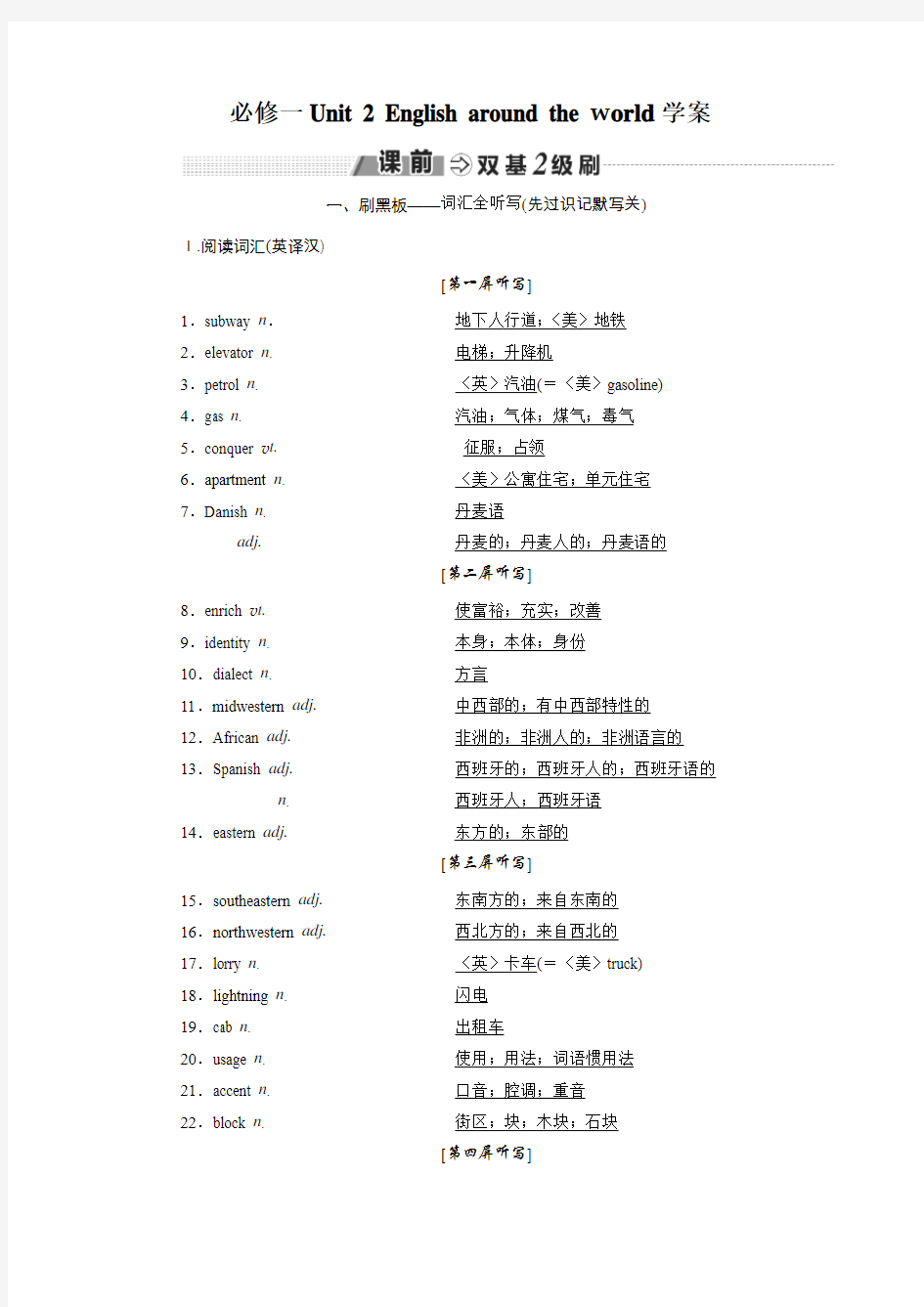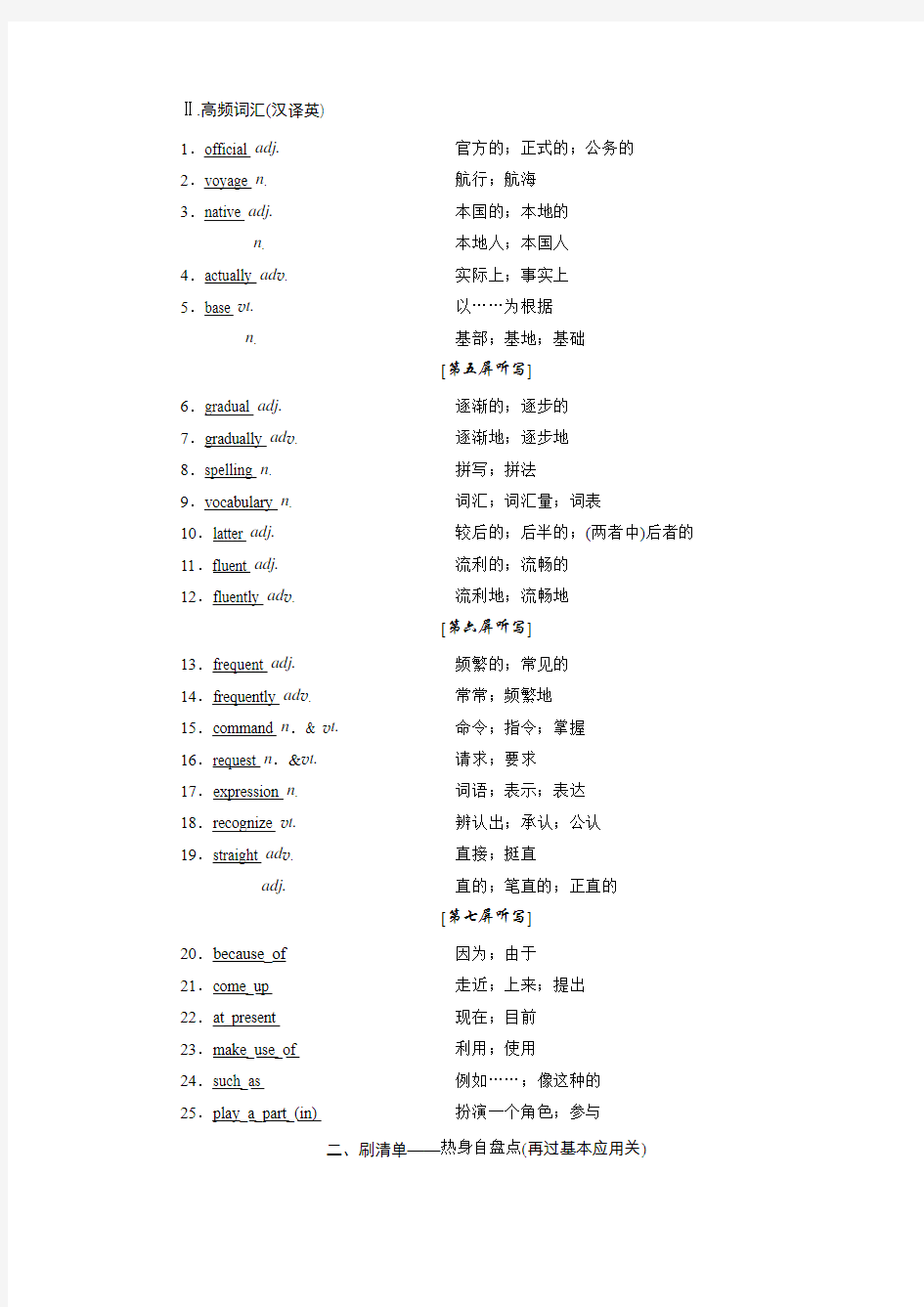2019届一轮复习人教版人教版必修一Unit 2 English around the world学案


必修一Unit 2 English around the w orld学案
一、刷黑板——词汇全听写(先过识记默写关)
Ⅰ.阅读词汇(英译汉)
[第一屏听写]
1.subway n.地下人行道;〈美〉地铁2.elevator n. 电梯;升降机
3.petrol n. 〈英〉汽油(=〈美〉gasoline) 4.gas n. 汽油;气体;煤气;毒气5.conquer v t.征服;占领
6.apartment n. 〈美〉公寓住宅;单元住宅7.Danish n. 丹麦语
adj.丹麦的;丹麦人的;丹麦语的
[第二屏听写]
8.enrich v t.使富裕;充实;改善
9.identity n. 本身;本体;身份
10.dialect n. 方言
11.midwestern adj.中西部的;有中西部特性的12.African adj.非洲的;非洲人的;非洲语言的13.Spanish adj.西班牙的;西班牙人的;西班牙语的n. 西班牙人;西班牙语
14.eastern adj.东方的;东部的
[第三屏听写]
15.southeastern adj.东南方的;来自东南的16.northwestern adj.西北方的;来自西北的
17.lorry n. 〈英〉卡车(=〈美〉truck) 18.lightning n. 闪电
19.cab n. 出租车
20.usage n. 使用;用法;词语惯用法21.accent n. 口音;腔调;重音
22.block n. 街区;块;木块;石块
[第四屏听写]
Ⅱ.高频词汇(汉译英)
1.official adj.官方的;正式的;公务的2.voyage n. 航行;航海
3.native adj.本国的;本地的
n. 本地人;本国人
4.actually ad v. 实际上;事实上
5.base v t.以……为根据
n. 基部;基地;基础
[第五屏听写]
6.gradual adj.逐渐的;逐步的
7.gradually ad v. 逐渐地;逐步地
8.spelling n. 拼写;拼法
9.vocabulary n. 词汇;词汇量;词表
10.latter adj.较后的;后半的;(两者中)后者的11.fluent adj.流利的;流畅的
12.fluently ad v. 流利地;流畅地
[第六屏听写]
13.frequent adj.频繁的;常见的14.frequently ad v. 常常;频繁地
15.command n.& v t.命令;指令;掌握
16.request n.&v t.请求;要求
17.expression n. 词语;表示;表达18.recognize v t.辨认出;承认;公认19.straight ad v. 直接;挺直
adj.直的;笔直的;正直的
[第七屏听写]
20.because_of因为;由于
21.come_up 走近;上来;提出
22.at_present 现在;目前
23.make_use_of 利用;使用
24.such_as 例如……;像这种的
25.play_a_part_(in) 扮演一个角色;参与
二、刷清单——热身自盘点(再过基本应用关)
(一)核心单词
(三)经典句式
一、过重点单词——纵引横联超人一点
1.base vt.以……为根据n.基部;基地;基础
[高考佳句]The research group produced two reports based on the survey, but neither contained any useful suggestions.(2015·福建高考单选)
以这个调查为基础,研究团队做了两个报告,但是都没有包含任何有用的建议。
①Basing (base) an important decision more on emotion than on reason, you will regret it sooner or later.
②First, he showed us the basic (base) steps and skills of making dough figurines.(2015·北京高考书面表达)
③Just as the saying goes,“One tree doesn't make a forest.”,our success is based on/upon cooperating with others.
2.command n.[C]命令;指令;[U]掌握vt.命令;指挥;掌握
[经典例句]We are supposed to learn English well because having a good command of English means more opportunities in the future.
我们理应学好英语,因为精通英语意味着在将来有更多的机会。
单句语法填空
①I'm at your command — what would you like me to do?
②If you do not serve others, you cannot take command of them.
句型转换
③The police commanded the witness to describe what had happened the day before.
→The police commanded that the witness (should)_describe_what_had_happened the day before.
单句写作
④除此之外,我精通英语并被选为英语课代表。(2015·陕西高考书面表达)
Besides, I have_such_a_good_command_of_English_that_I am elected as assistant to my English teacher.
[联想发散]command后面跟从句时,从句谓语用“(should+) 动词原形”。以下动词具有相同的用法:
3.request n.& vt.请求;要求
[经典例句]All members of the club are requested to attend the annual meeting.
请俱乐部的全体会员务必参加年会。
单句语法填空
①All the students are requested to_attend (attend) the annual school celebration.
②What's your opinion of Mr Li's request that we (should)_spend (spend) half an hour reading English aloud every morning?
③It is_requested (request) that all the visitors should not take pictures of the exhibitions.
补全句子
④I sincerely hope that you_will_give_our_request_your_special_consideration.
我衷心希望你对我们的请求特别给予考虑一下。
[名师指津]动词request后的宾语从句以及名词request后的表语从句、同位语从句都要用虚拟语气,即谓语动词为“(should+)动词原形”。
4.recognize vt.辨认出;承认;公认
[教材原句]Although many Americans move a lot, they still recognize and understand each other's dialects.
虽然许多美国人经常搬迁,但他们仍然能识别并理解彼此的方言。
单句语法填空
①The film star wears sunglasses. Therefore, he can go shopping without being_recognized (recognize).
②I went back to my hometown after 20 years and the city had changed beyond all recognition (recognize).
补全句子
③It_is_recognized_that environmental pollution has become one of the most serious problems.
人们一致认为环境污染已经成了最严重的问题之一。
Ⅰ.单词拼写
1.Though he is not a native (本国的) English speaker, he can speak English very fluently.
2.He thought I had known the fact. But actually (事实上), I knew nothing about it.
3.The general commanded (命令) his men to attack the city.
4.The scenery was beautiful beyond expression (表达).
5.Judging from his accent (口音), he must be from North East of China.
6.I recognized (辨认出) her voice immediately I picked up the phone.
7.Passengers are kindly requested (要求) not to smoke in the bus.
8.He presented two solutions. The latter (后者) seems much better.
Ⅱ.单句语法填空
1.Please set off earlier because the buses run less frequently (frequent) on Sundays.
2.My hometown has changed beyond recognition (recognize) since I was last here. 3.You'll be able to choose a room based on your own personal tastes.
4.Nearly one hundred countries recognize English as their official (office) language.
5.The manager gave his command that measures (should)_be_taken (take) immediately to correct all the mistakes made in marketing.
6.Her worried expression (express) on her face suggested that she was very frightened.
